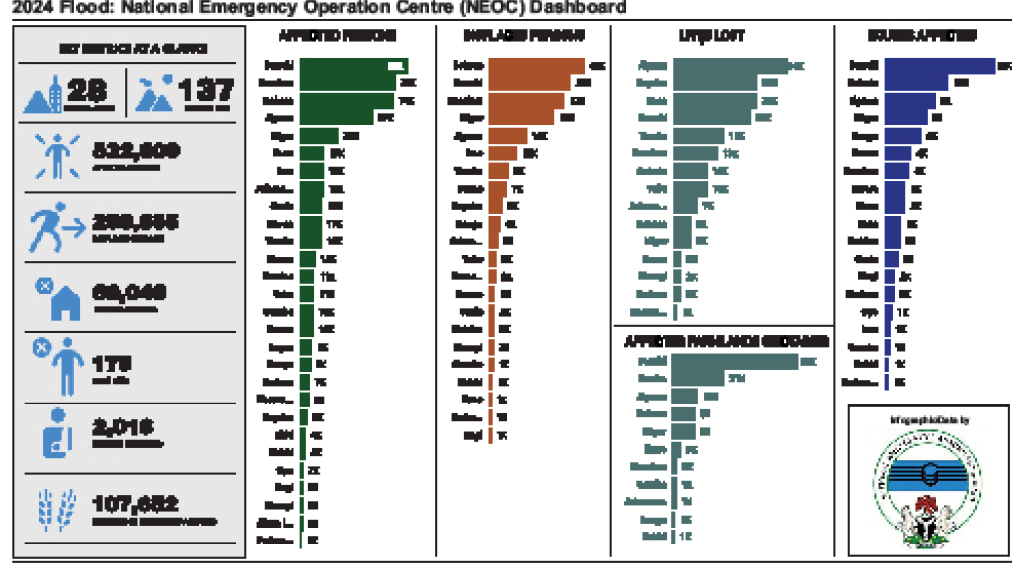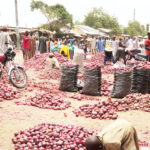Flood has so far killed a total of 179 persons in 15 states and displaced 208,655 others in 22 states within this year, the National Emergency Management Agency (NEMA) has said.
The agency, which disclosed this in its 2024 Flood Updates released on Thursday also said 107,652 hectares of farmland and 80,049 houses were destroyed.
The states most affected by the flooding, which was caused by unprecedented rainfall and the rising of rivers Niger and Benue, are mostly in the northern part of Nigeria.
All the incidents happened in 137 local government areas in 28 states.
The NEMA said 86,000 persons were affected in Bauchi, Zamfara (75,000), Sokoto (74,000), Jigawa (57,000), Niger (30,000), Kano (19,000), Imo (18,000), Adamawa (18,000), Ondo (17,000), Borno (17,000), Taraba (16,000), Kwara (12,000), Katsina (11,000), Yobe (11,000), Gombe (10,000), Benue (10,000), Lagos (9,000), Enugu (8,000), Kaduna (7,000), Nasarawa (6,000), Bayelsa (5,000), Ekiti (4,000), Kebbi (4,000), Oyo (2,000), Kogi (2,000), Ebonyi (2,000), Akwa Ibom (2,000) and Federal Capital Territory (1,000).
- Gov Yusuf orders closure of MDAs’ accounts
- Ajaero to appear before police over ‘terrorism financing’ Thursday
It said Jigawa State recorded 34 deaths, Bayelsa (25), Kano (25), Bauchi (23), Taraba (15), Zamfara (13), Sokoto (10), Yobe (10), Adamawa (7), Katsina (5), Niger (5), Borno (2), Ebonyi (2), Kaduna (2) and Nasarawa (1).
The agency said Sokoto recorded 41,000 displaced persons, Bauchi (35,000), Zamfara (32,000), Niger (28,000), Jigawa (16,000), Imo (12,000), Taraba (8,000), Borno (7,000), Bayelsa (5,000), Enugu (4,000), Adamawa (3,000), Yobe (3,000), Nasarawa (3,000), Benue (2,000), Ondo (2,000), Katsina (2,000), Ebonyi (2,000), Gombe (1,000), Kebbi (1,000), Kano (1,000), FCT (1,000), Kogi (1,000).
The agency said 50,000 hectares of farmlands were affected in Bauchi State, Taraba (21,000), Jigawa (10,000), Sokoto (9,000), Niger (9,000), Kano (3,000), Zamfara (2,000), Gombe (1,000), Adamawa (1,000), Enugu (1,000) and Kebbi (1,000).
The houses destroyed were 18,000 in Bauchi, Sokoto (10,000), Jigawa (8,000), Niger (7,000), Enugu (6,000), Borno (4,000), Zamfara (4,000), Kwara (3,000), Kano (3,000), Yobe (3,000), Katsina (2,000), Ondo (2,000), Kogi (2,000), Kaduna (2,000), Oyo (1,000), Imo (1,000), Gombe (1,000), Kebbi (1,000) and FCT (1,000).
The Director-General of the NEMA, Zubaida Umar, who spoke yesterday when the Chief of Staff to the President, Femi Gbajabiamila, visited the agency, said the NEMA had carried out disaster assessment for several incidents in almost all states in the country.
She said funding was a major challenge that has been affecting the operations of the agency.
Responding, Gbajabiamila said a law should be made to get states to remit counterpart funds in order to fund the operations of the NEMA.
He said at the moment, the nation’s funds were scarce and limited, hence the need to think outside the box and get alternative means to fund the agency.
Gbajabiamila noted that he visited the NEMA to know its challenges and think of finding solutions.
He urged the agency to focus on flood and disaster prevention as much as it focuses on mitigation.
Flooding in 2022, 2023
The NEMA had, in 2022, said flooding killed 662 persons and displaced 2,430,445 others.
On October 10, 2023, the NEMA had said 45 persons had died while 171,545 persons had been displaced as a result of widespread flooding experienced across the country last year.
It had said as of October 7, flooding had affected 13 states with 22,666 homes partially damaged and 5,358 totally damaged; while 9,179 hectares of farmlands were partially destroyed and 8,754 hectares of farmlands totally destroyed.
Tinubu mourns victims, pledges aid for affected families
Reacting to the flooding. President Bola Ahmed Tinubu yesterday called for concerted efforts to address what he called existential environmental concerns and build a more climate resilient and adaptive society across the country.
He said that his administration would continue to provide the needed support for victims as well as timely warnings to mitigate environmental mishaps.
Tinubu, according to a statement by his Special Adviser on Media and Publicity, Ajuri Ngelale, said the government received the news of the flood with grief.
He noted said the recent data by the NEMA indicated that lives had been lost, “with thousands of hectares of farmlands damaged and thousands of people displaced by floods across the country.”
The presidential spokesman said Tinubu sympathized with “all victims of these ravages of nature, especially bereaved families, farmers, displaced communities and those who have lost property.”
Ngelale added: “The president prays for the repose of the souls of the deceased, while assuring Nigerians that his administration, through the relevant agencies, will continue to provide the needed support for victims, as well as timely warnings to mitigate the impact of environmental mishaps.”
NEMA warns of severe incidents in September, October
The NEMA warned that the destruction caused by the severe flooding in the country could increase in September and October this year.
Its spokesperson, Manzo Ezekiel, was quoted by Reuters as saying that the situation in the North was very dire.
He said 41,344 people were displaced by flooding in Jigawa, Adamawa and Taraba states.
Ezekiel said floods caused by heavy rains had destroyed more than 693 hectares of farmlands in the region.
“We are just entering into the peak of the season, particularly in the northern part of the country and the situation is very dire,” Ezekiel said.
“We also have information about the high tide in the upper countries of the River Niger before Nigeria. All of these are flowing towards Nigeria. We are beginning to see a manifestation of our predictions,” the NEMA’s spokesman stated.
Farm harvests will be affected this year– Minister
The Minister of Agriculture and Food Security, Abubakar Kyari, had, on Tuesday said the anticipated farm harvests would be affected this year. He also said the situation might have a negative impact on the farmers’ social and economic wellbeing.
He said, “As we witness the devastation caused by the recent flooding in our agricultural heartlands, my thoughts turn to the hardworking farmers whose livelihoods have been swept away by the unforgiving forces of nature.
“The impact of this will be felt on the anticipated harvest this year, though we are hopeful it will have minimal effect on national food security.”
The minister said the federal government would scale up investment in technologies that would minimize such impact in the future.
“President Bola Ahmed Tinubu has encouraged us to invest in technologies and practices that empower our farmers to adapt to a changing climate and safeguard their livelihoods against unpredictable weather patterns,” he said.
Kyari also said the government would intensify the 2024/2025 dry season farming to reduce the impact of the two weather phenomena. He said his ministry and that of Water Resources and Sanitation were collaborating on improving areas under cultivation during dry season farming.
“We have constituted a committee already between the staff of the two ministries and key players are working on ways to achieve the objectives of increasing food production through dry season farming,” he added.

 Join Daily Trust WhatsApp Community For Quick Access To News and Happenings Around You.
Join Daily Trust WhatsApp Community For Quick Access To News and Happenings Around You.

